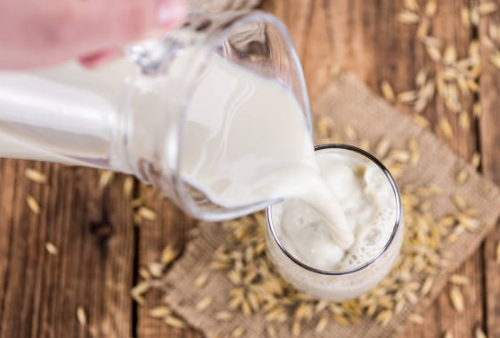Oat milk started as the new trendy milk alternative in cities—and now it’s one of the most popular non-dairy drinks around. You’ve probably seen it at coffee shops, in grocery stores, or even on Instagram.
Whether you’ve already hopped on the oat milk bandwagon or you’re just curious, you might still have questions: Is it healthy? How is it made?
What Is Oat Milk?
Like other non-dairy beverages, oat milk is a plant-based alternative to cow’s milk. It’s made by blending oats with water and then straining the mixture to create a creamy, milk-like liquid that looks similar to traditional dairy milk.
While it’s easy to make oat milk at home (more on that below), many brands offer ready-to-drink versions and oat milk-based products. Some popular brands include Oatly, Califia Farms, Elmhurst, Planet Oat, and Silk Oat Yeah!

Is Oat Milk Healthy?
It depends. Look for products with minimal processing, no added sugars, and no unnecessary preservatives or stabilizers.
Some store-bought oat milks are fortified with key nutrients like calcium, vitamin D, and vitamin B12—similar to what’s in cow’s milk. However, oat milk tends to be low in protein, so be sure to include enough protein in your meals and snacks.
How Does Oat Milk Compare to Cow’s Milk and Other Plant Milks?
Oat milk is a great dairy-free option, especially for those who want a versatile plant-based milk. It generally contains more protein than almond, coconut, or rice milk—but less than pea milk or soy milk.
That said, most Americans already get more than enough protein, so oat milk can be a healthy option—especially if you’re lactose intolerant, want to eat more plant-based foods, or simply like the taste.
Many people prefer oat milk because of its naturally sweet flavor—even unsweetened varieties taste pleasant.
Compared to dairy milk, oat milk has fewer nutrients like calcium, vitamin D, potassium, and protein. Cow’s milk remains a nutrient-rich choice—if your body can tolerate it.
Benefits of Oat Milk
-
Great for people with lactose intolerance or those avoiding dairy for other reasons.
-
Nut- and soy-free, making it a safe choice for those with allergies.
-
Naturally gluten-free, if made from certified gluten-free oats.
-
Contains beta-glucan, a type of fiber found in oats that may help lower cholesterol and support heart health.
-
More eco-friendly than dairy, almond, or soy milk—oats require less water and land to grow, making oat milk a more sustainable option.
How to Make Oat Milk at Home
Another plus? Oat milk is super easy to make at home. Unlike nut milks, it doesn’t require soaking, and oats are cheaper than almonds or cashews. Homemade oat milk is fresh and free from additives.
Ingredients
-
1 cup rolled oats (gluten-free if needed)
-
3 cups filtered water
-
Pinch of salt (optional)
-
Splash of vanilla extract (optional)
Instructions
-
Blend all ingredients until smooth. (Only add vanilla if you’re using the milk in sweet recipes or drinks.)
-
Strain through a fine mesh sieve, nut milk bag, clean dish towel, or triple-layered cheesecloth. Save the liquid.
-
Store in the fridge and use within a week.
Keep in mind: Homemade oat milk doesn’t have added vitamins or minerals like store-bought versions, and it spoils faster. But when made in small batches, it stays fresh and reduces food waste—plus, it’s 100% natural.
Bottom Line
For those avoiding dairy, soy, or nuts, oat milk is a fantastic alternative. Just remember that it lacks the protein, calcium, vitamin B12, and vitamin D found in cow’s milk, so it’s important to get those nutrients from other sources in your diet.

